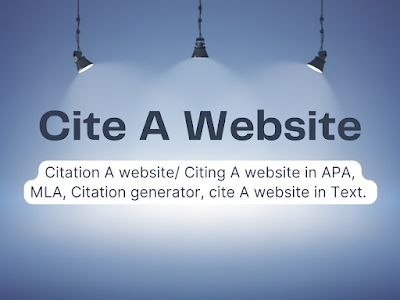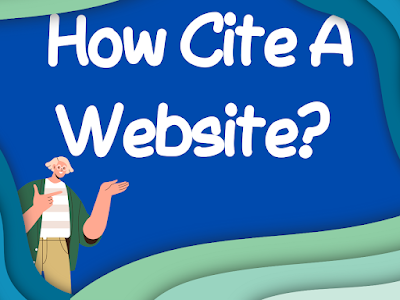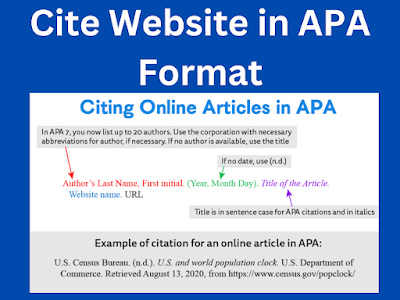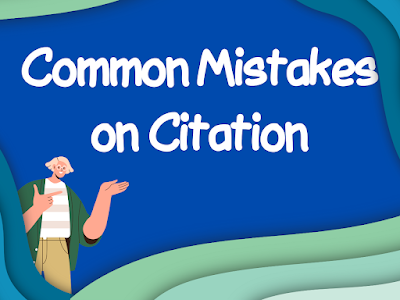When conducting research, it's essential to include accurate and reliable sources. As a writer, you not only want to ensure that your content is credible, but you also want to give credit to the original sources. That's where citation comes in. In the digital age, websites have become an increasingly popular source for information, making it vital to know how to properly cite them. cite on Article, cite a website leee, cite a website chicago style, citation machine,
CITE A WEBSITE
In this blog post, we'll explore everything you need to know about citing a website, including why it's essential, how to do it properly, and the consequences of failing to cite correctly. Whether you're a student, researcher, or content creator, understanding website citation will help enhance the credibility of your work and improve your search engine ranking. So, let's dive into the world of website citation and take your writing to the next level. cite this for me, in Text citation, APA citation generator,
What is Citing Website?
Citing a website involves acknowledging and giving credit to the original source of information used in your research or writing. It provides readers with the necessary information to find the source material and verify the accuracy of your work. In other words, when you cite a website, you are letting your readers know where you obtained the information and giving credit to the original author or publisher. This practice is essential to maintain academic integrity, avoid plagiarism, and enhance the credibility of your work.
Why You Need to Cite Websites?
Citing websites is an essential part of any research or content creation process. There are several reasons why you need to cite websites, including the importance of giving credit to the original source of information. When you use someone else's work, you are building on their ideas, research, and creativity.
Citing sources is a way to acknowledge that you are not presenting those ideas as your own and to respect the intellectual property of others. Additionally, citing sources enhances the credibility of your work, making it more trustworthy and reliable. By referencing reputable sources, you can demonstrate that you have done your research and have a strong understanding of your subject matter.
On the other hand, failing to cite sources properly can have serious consequences, including accusations of plagiarism and potential legal issues. Therefore, it's crucial to take the time to cite sources accurately and effectively to avoid these negative outcomes.
Read : Our Most Viewed and Loved Articles
The Future is Here: Understanding Artificial Intelligence and its Impact on Society
Quantum Computing IBM: Exploring the Future of Computing Technology
Unleash the Power of OpenAI's ChatGPT: The Future of Conversational AI
How can citing a website enhance the credibility of your work?
Citing a website is an essential part of building credibility and reliability in your work. By citing your sources properly, you demonstrate that you have conducted thorough research and have used credible and reliable sources to support your arguments.
Citing website sources can help to show that you have used the most up-to-date and relevant information available, and that you have taken the time to evaluate the credibility of your sources. This can increase the confidence of your readers in your work, as they can see that you have taken the necessary steps to ensure the accuracy and reliability of your content.
Additionally, by providing clear and accurate citations, you make it easier for your readers to follow up on your research and verify your claims, further increasing the credibility of your work. Overall, citing website sources can enhance the credibility of your work and help you to build a strong and trustworthy reputation in your field.
How Cite a Websites?
There are several citation styles that you can use to cite websites, including APA, MLA, Chicago, and more. Each style has its own set of guidelines, so it's important to choose the appropriate style for your work. For instance, APA style is commonly used in social sciences, while MLA is often used in humanities. Once you have selected a citation style, you can use a step-by-step guide to cite a website accurately.
For instance, in APA style, you will need to include the author's name, date of publication, title of the page, name of the website, and URL. In MLA style, you will need to include the author's name, title of the page, name of the website, date of publication, and URL.
There are many online tools and resources available to help you generate citations, such as citation generators, browser extensions, and citation management software. These tools can save you time and ensure that your citations are accurate and consistent. However, it's important to double-check the generated citations to ensure they are correct and properly formatted.
APA Website
To cite a website in APA format, you should include the following information:
Author. (Publication date). Title of webpage or article. Title of website. URL.
If there is no publication date, use the abbreviation "n.d." in place of the year.
Here is an example of an APA citation for a website:
Smith, J. (2020). The benefits of exercise. Healthline. https://www.healthline.com/health/fitness-exercise/benefits-of-exercise
If the website has no author, start the citation with the title of the webpage or article:
"Depression." (n.d.). National Institute of Mental Health. https://www.nimh.nih.gov/health/topics/depression/index.shtml
Remember to always check with your instructor or the style guide you are using to make sure you are following the correct format.
How Cite in APA format?
To cite a website in APA format, you will need the following information:
Here is the basic format for an APA citation of a website: cite in apa format
Author, A. A. (Year, Month Day of publication). Title of webpage. Name of Website. URL
For example:
Smith, J. (2022, January 15). How to Cite a Website in APA Format. Example Website. https://www.example.com/how-to-cite-website-apa/
If the website does not have an identifiable author, use the title of the webpage instead. If there is no publication date available, use "n.d." in place of the year. Make sure to also include the retrieval date of the website if the content is likely to change or not archived, in the format of "Retrieved Month Day, Year, from URL".
How can you generate citations for a website using each citation style?
To generate citations for a website using each citation style, you can follow these general guidelines:
APA: For an APA citation, start with the author's last name, followed by the first and middle initials. Next, include the date of publication in parentheses, followed by the title of the article or webpage, the name of the website, and the URL. For example: Smith, J. M. (2019). How to Cite Websites. Example Website. https://www.example.com/cite.
MLA: For an MLA citation, start with the author's name, followed by the title of the article or webpage, the name of the website, the date of publication, and the URL. Next, indicate the medium of publication, such as "Web" or "PDF". For example: Smith, John. "How to Cite Websites." Example Website, 20 May 2019, https://www.example.com/cite. Web.
Chicago: For a Chicago citation, start with the author's name, followed by the title of the article or webpage, the name of the website, and the date of publication. Next, include the URL in angle brackets, followed by the date of access in parentheses. For example: Smith, John. "How to Cite Websites." Example Website, May 20, 2019. https://www.example.com/cite (accessed January 1, 2023).
There are also online citation generators that can help you create citations in different styles for your website sources. Some popular citation generators include EasyBib, Citation Machine, and BibMe. These tools allow you to enter the relevant information for your source and generate a properly formatted citation in your desired citation style.
What are some common mistakes to avoid when citing a website?
When citing a website, there are several common mistakes that should be avoided to ensure the accuracy and reliability of your sources. One common mistake is forgetting to include key information, such as the date of publication or the website's URL. Another mistake is incorrect formatting of citations, such as using the wrong font or spacing, or not following the specific guidelines for your chosen citation style. Mixing different citation styles is also a common mistake, which can lead to confusion and inconsistency in your sources.
To avoid these mistakes, it is important to double-check your sources and ensure that you have all of the necessary information to create accurate citations. You can also use online citation generators or consult a style guide to help you properly format your citations.
How can you ensure that your citations are accurate and up-to-date?
To ensure that your citations are accurate and up-to-date, it is important to use reliable and credible sources for your research. You should also double-check your sources to ensure that you have correctly recorded all of the necessary information for your citation.
Additionally, you can use tools such as plagiarism checkers to ensure that you have not accidentally plagiarized any content in your work. It is also a good practice to keep a record of all your sources for future reference, in case you need to revisit them or update your citations.
Finally, it is important to stay current with any updates or changes to citation guidelines or formatting rules, as these can change over time. By staying organized and vigilant in your research and citation practices, you can ensure that your work is accurate and up-to-date.
Common Mistakes to Avoid When Citing Websites
Citing websites accurately can be a challenging task, and there are several common mistakes that you should be aware of. One of the most significant mistakes is forgetting to include key information, such as the date of publication or the website's URL.
This information is critical for establishing the credibility and reliability of your sources. Another mistake is incorrect formatting of citations. Different citation styles have different guidelines for formatting, so it's important to follow the appropriate style for your work. Mixing different citation styles is also a common mistake to avoid. Using inconsistent citation styles can make your work appear unprofessional and confusing for your audience.
Finally, failing to verify the accuracy of your sources can be a costly mistake. Websites can be unreliable, so it's important to take the time to check the accuracy and credibility of your sources before citing them. By avoiding these common mistakes, you can ensure that your citations are accurate, reliable, and trustworthy.
Best Practices for Citing Websites
Citing websites accurately is essential for maintaining the credibility and reliability of your work. To ensure that your citations are accurate and trustworthy, it's important to follow some best practices.
One of the most important practices is double-checking your sources to ensure accuracy. Websites can be unreliable, so it's crucial to verify the information you are using. You can also use plagiarism checkers to avoid unintentional plagiarism. Plagiarism checkers can identify any potential instances of plagiarism and help you to correct them before submitting your work.
Additionally, it's important to keep a record of all your sources for future reference. This can help you to avoid repeating your research and ensure that you have accurate citations for all of your sources. By following these best practices, you can create reliable and trustworthy content that accurately reflects your research and ideas.
How does citing a website different from citing other types of sources?
Citing a website different from citing other types of sources in several ways. One of the key differences is the lack of a fixed structure for citing a website. Unlike books or journals, websites may not have a standard format for presenting their information. This means that you may need to be flexible in your citation approach to ensure accuracy and consistency. Additionally, websites can be more prone to change than other sources.
Websites may add or remove information over time, and URLs can change or become obsolete. As a result, it's important to ensure that your website citations are up-to-date and accurately reflect the content you are citing.
Finally, websites can vary in quality and reliability, making it essential to evaluate the credibility of the website before citing it. By being aware of these differences and taking steps to address them, you can create accurate and reliable citations for your website sources.
What are the consequences of not citing a website properly?
Failing to cite a website properly can have serious consequences for your work. One of the most significant consequences is the risk of unintentional plagiarism. Without proper citation, you may inadvertently use someone else's ideas or words without giving them credit. This can result in accusations of plagiarism, which can have serious academic and professional consequences. Additionally, not citing sources properly can damage the credibility and reliability of your work. It can make your content appear less trustworthy and professional, and can lead to a loss of confidence from your audience.
Finally, failing to cite sources properly can result in legal consequences. Copyright laws protect intellectual property, and using someone else's work without permission or citation can result in legal action. By citing your website sources properly, you can avoid these consequences and create accurate, trustworthy content that reflects your ideas and research.
What are some of the different citation styles that can be used for websites (APA, MLA, Chicago, etc.)?
Sure, here's a paragraph on different citation styles that can be used for websites:
There are several citation styles that can be used for citing websites, including APA, MLA, Chicago, and more. Each citation style has its own unique set of guidelines for formatting citations, including how to cite specific elements such as author names, publication dates, titles, and URLs.
The American Psychological Association style is commonly used in the social sciences, and is known for its use of author-date citations. The Modern Language Association style is often used in the humanities, and is known for its use of in-text citations and Works Cited page.
The Chicago Manual of Style is a comprehensive style guide that is often used in the publishing industry, and includes specific guidelines for citing digital sources. Other citation styles that may be used for websites include the Harvard style, the Vancouver style, and the IEEE style. By understanding the guidelines and requirements for each citation style, you can create accurate and consistent citations for your website sources.
Read : Our Most Viewed and Loved Articles
Unlocking the Potential of Cloud Computing: Everything You Need to Know
Ultimate Guide to VPN: Protect Your Online Privacy and Security Today
GB WhatsApp : Download Latest 2023 | Installation Guide GB WhatsApp
Bard AI: A Game-Changing Artificial Intelligence Platform
FAQ:
How can citing a website help improve your search engine ranking and overall SEO?
Citing a website can indirectly help improve your search engine ranking and overall SEO by enhancing the credibility and reliability of your content. When you properly cite your sources, you demonstrate that you have done your research and have used high-quality sources to support your work. This can help establish your website or content as a trusted and authoritative source of information, which can increase its visibility and popularity among users. Additionally, citing sources can help build backlinks to your website, which are links from other websites to your own. Backlinks are an important factor in determining search engine rankings, as they indicate that other websites view your content as valuable and relevant. By incorporating citations into your content and building a network of high-quality backlinks, you can help improve your search engine ranking and overall SEO.
What are some best practices for citing websites to improve your SEO?
To improve your SEO through proper citation practices, it is important to follow some best practices when citing websites. One key practice is to ensure that your citations are accurate, reliable, and up-to-date.
This helps establish your website or content as a credible source of information, which can increase its visibility and popularity among users. It is also important to use relevant and high-quality sources for your research, as this can help build backlinks to your website. Another best practice is to use descriptive and keyword-rich anchor text when linking to other websites, as this can help improve your website's search engine ranking for relevant keywords.
Finally, it is important to stay current with any updates or changes to citation guidelines or formatting rules, as these can change over time and may impact your SEO efforts. By following these best practices for citing websites, you can help improve your SEO and establish your website or content as a trusted and authoritative source of information.
How can you analyze your competitors' citation profiles to improve your own?
One way to analyze your competitors' citation profiles is to identify the sources that they are using to support their content. You can do this by conducting a backlink analysis of their website using tools such as Ahrefs or Majestic. This will allow you to see the sources that are linking to their website, and potentially identify high-quality sources that you could also use for your own content. You can also look at the types of content that your competitors are producing, and see how they are citing sources within that content.
For example, are they using specific citation styles or formatting practices that could improve your own citations? By analyzing your competitors' citation profiles, you can identify opportunities to improve your own citation practices, such as using high-quality sources, building backlinks, and following best practices for citation formatting.
What are some tools and resources available to help you generate and validate citations for websites?
There are a variety of tools and resources available to help you generate and validate citations for websites. One popular tool is EasyBib, which can help you generate citations in a variety of citation styles, including APA, MLA, and Chicago. Another useful tool is Zotero, which allows you to collect, organize, and cite sources across multiple devices and platforms. In addition to these citation generators, you can also use plagiarism checkers such as Turnitin or Grammarly to ensure that your citations are accurate and free from plagiarism.
These tools can help you identify any missing or incorrect citations, and can also help you avoid unintentional plagiarism.
Finally, you can also consult online resources such as the Purdue Online Writing Lab (OWL) or the Modern Language Association (MLA) website for citation guidelines and examples. By using these tools and resources, you can ensure that your website citations are accurate, reliable, and up-to-date.
How can you ensure that your website is properly marked up for optimal citation and SEO performance?
To ensure that your website is properly marked up for optimal citation and SEO performance, you can use structured data markup to provide search engines with additional information about the content on your website. This can include information about authors, publication dates, and other relevant metadata that can help search engines understand the context and relevance of your content.
You can use schema.org, a collaborative community effort to create and maintain schemas for structured data on the internet, to add structured data markup to your website. This markup can help your website stand out in search engine results by displaying additional information about your content, such as star ratings, publication dates, and other details.
Additionally, you can use appropriate tags, such as the <title> tag and the <meta> description tag, to ensure that your website's content is properly optimized for search engines. By properly marking up your website and using appropriate tags, you can improve your website's citation and SEO performance, making it more likely to be discovered by search engines and users.
What are some potential ethical considerations to keep in mind when citing websites?
When citing websites, there are several ethical considerations that you should keep in mind. One key consideration is ensuring that you are citing accurate and reliable sources, and that you are not citing websites that contain false or misleading information. It is also important to avoid plagiarism by properly crediting the original author of the content.
Additionally, you should respect the copyright of the content owners and only use their content with permission or within the bounds of fair use. Another consideration is to avoid endorsing or promoting websites that contain biased or discriminatory content.
Finally, you should consider the impact of your citations on the websites themselves, as excessive or inappropriate citation practices can lead to issues such as link rot, which can cause broken links and negatively impact the usability and reliability of the cited content. By keeping these ethical considerations in mind, you can ensure that your citations are accurate, reliable, and ethically sound.
How do I cite a sourse with no author?
If a source has no identifiable author, you can use the title of the source in the in-text citation and reference list in place of the author's name. Here are the general guidelines for citing sources with no author in APA style:
In-Text Citation:
Use the title of the source in place of the author's name within the text.
Enclose the title in quotation marks if it refers to an article, chapter or webpage.
Italicize the title if it refers to a book or report.
If the title is too long, shorten it to the first few words of the title.
For example: ("Title of Article," 2022) or ("First Few Words of Book Title," 2022)
Reference List:
Use the title of the source in place of the author's name.
If the source is an article, chapter or webpage, use quotation marks around the title and capitalize only the first word of the title and subtitle, if any.
If the source is a book or report, italicize the title and capitalize only the first word of the title and subtitle, if any.
If the source is a webpage or online document, include the URL or the DOI, if available.
For example:
Title of Article. (Year). Journal Name, Volume(issue), page numbers. doi:xx.xxxxxxxxxx
Title of Book. (Year). Publisher.
Title of Webpage. (Year, Month Day). Name of Website. Retrieved Month Day, Year, from URL
Note that if the source has a corporate author, you should use the name of the organization as the author in the in-text citation and reference list.
How do I cite a source with no Page numbers?
If a source does not have page numbers, you can use other ways to indicate the specific location of the information you are citing, such as paragraph numbers, section headings, or timestamps. Here are the general guidelines for citing sources without page numbers in APA style:
In-Text Citation:
Use a shortened version of the title in the in-text citation.
Enclose the title in quotation marks if it refers to an article, chapter or webpage.
Italicize the title if it refers to a book or report.
If the source has a paragraph number, use the abbreviation "para." followed by the number.
If the source has section headings, use the heading name and count the number of the paragraph.
If the source is a video or audio recording, use the timestamp.
For example: ("Title of Article," para. 4) or ("First Few Words of Book Title," chap. 2, para. 3)
Reference List:
Use the title of the source in place of the page numbers.
If the source is an article, chapter or webpage, use quotation marks around the title and capitalize only the first word of the title and subtitle, if any.
If the source is a book or report, italicize the title and capitalize only the first word of the title and subtitle, if any.
If the source is a webpage or online document, include the URL or the DOI, if available.
For example:
Title of Article. (Year). Journal Name, Volume(issue), page numbers. doi:xx.xxxxxxxxxx
Title of Book. (Year). Publisher.
Title of Webpage. (Year, Month Day). Name of Website. Retrieved Month Day, Year, from URL
Note that if you are citing a source with no identifiable author and no page numbers, use the title of the source in both the in-text citation and reference list.
Citing a Website in Text
When citing a website in text, it is important to include the author or organization responsible for the content and the publication date. If no author or publication date is available, use the title of the article or page in quotation marks.
For example:
According to the American Cancer Society, "there is no sure way to prevent breast cancer" ("Breast Cancer Prevention," n.d.).
The Centers for Disease Control and Prevention reported that "the risk of severe illness and death from COVID-19 is higher in older adults and people of any age with certain underlying medical conditions" ("People Who Are at Increased Risk," 2021).
A recent study found that "the majority of respondents reported experiencing increased levels of stress during the pandemic" ("The Impact of COVID-19 on Mental Health," 2020).
How to cite a website in essay?
When citing a website in an essay, you can use either in-text citations or footnotes/endnotes, depending on your instructor's preference or the style guide you are using.
For in-text citations, you should include the author's last name and the publication date in parentheses after the information you are citing. If there is no author, use the title of the webpage or article in quotation marks.
For example:
According to the American Psychological Association, "APA Style uses a unique headings system to separate and classify paper sections" (APA, 2021).
The website for the National Institute of Mental Health explains that "symptoms of depression may include feelings of sadness, hopelessness, or irritability" ("Depression," n.d.).
A recent study found that "over 80% of teenagers in the United States use social media on a daily basis" (Smith, 2020).
In the reference list or bibliography, you should provide a complete citation for each source you have cited, following the appropriate style guide for your discipline or assignment.
For example, for an APA reference for a website, you would typically include the author or organization, the publication date, the title of the webpage or article, the URL, and the date you accessed the website.
How to cite a website APA 7th edition?
To cite a website in APA 7th edition format, you should include the following information:
Author. (Publication date). Title of webpage or article. Title of website. URL.
If there is no publication date, use the abbreviation "n.d." in place of the year.
Here is an example of an APA 7th edition citation for a website:
Smith, J. (2020). The benefits of exercise. Healthline. https://www.healthline.com/health/fitness-exercise/benefits-of-exercise
If the website has no author, start the citation with the title of the webpage or article:
"Depression." (n.d.). National Institute of Mental Health. https://www.nimh.nih.gov/health/topics/depression/index.shtml
Remember to always check with your instructor or the style guide you are using to make sure you are following the correct format.
How to cite an online Article APA?
To cite an online article in APA format, you should include the following information:
Author. (Publication date). Title of article. Title of publication. URL.
If there is no publication date, use the abbreviation "n.d." in place of the year.
Here is an example of an APA citation for an online article:
Smith, J. (2020). The benefits of exercise. Healthline. https://www.healthline.com/health/fitness-exercise/benefits-of-exercise
If the online article is from a scholarly journal, you will need to include additional information such as the volume and issue numbers, as well as the DOI or URL of the article:
Jones, T. (2018). The effects of mindfulness meditation on anxiety and depression in adults. Journal of Counseling Psychology, 65(3), 284-290. https://doi.org/10.1037/cou0000251
Remember to always check with your instructor or the style guide you are using to make sure you are following the correct format.
How to Cite a Website in Text MLA?
To cite a website in MLA format in your in-text citation, you should include the author's last name and the page number where the information can be found. If the author's name is not available, use a shortened version of the title in quotation marks.
Here is an example of an MLA in-text citation for a website:
(Author's Last Name page number).
For example: (Smith 4)
If the website does not have page numbers, you can use a section title or a shortened version of the title in quotation marks.
For example: ("Benefits of Exercise")
Remember to always check with your instructor or the style guide you are using to make sure you are following the correct format.
Read : Our Most Viewed and Loved Articles
The Ultimate Guide to Chatbots: Revolutionizing Customer Service
A Beginner's Guide to Camera2 API: Enabling and Using Advanced Camera Features
Unleashing the Power of AI Enlargers: The Future of Image Processing
Conclusion:
In conclusion of Cite A Website, citing a website is an important aspect of accademic writing and research. Not only does it give credit to the original source, but it also enhances the credibility of your work and helps to avoid plagiarism. By following the best practices for citing websites and avoiding common mistakes, you can ensure that your citations are accurate and up-to-date. Moreover, using appropriate citation styles and tools can make the process of generating and validating citations much easier.
By incorporating these practices into your writing, you can achieve better search engine rankings, optimize your SEO performance, and ultimately create higher quality content. So remember to always cite your sources properly and give credit where credit is due. Cite A website apa, cite A website mla, website citation generator, citation website, how to cute A website apa, cite in apa format









0 Comments